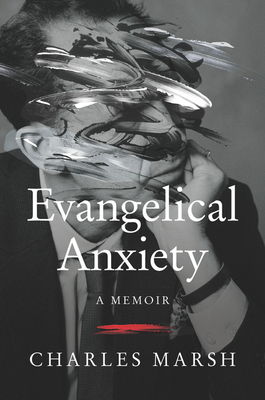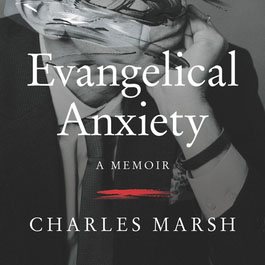Evangelical Anxiety: A Memoir

One of the most talked-about books this summer among Christians has been Charles Marsh’s Evangelical Anxiety: A Memoir. In it Marsh, an acclaimed scholar who is professor of religious studies at the University of Virginia and director of the Project on Lived Theology vulnerably shares about his mental health breakdown and journey through psychotherapy as an evangelical who grew up in a Southern conservative evangelical world that looked upon psychology with deep suspicion and scorn.
Marsh’s anxiety and severe panic attacks were birthed during his younger years growing up in the South when his father, a Baptist minister, wrestled with congregants (including some of the church’s leading members) who were part of the Ku Klux Klan. Marsh’s father expunged them from the congregation but the KKK retaliated with both threatened and actual violence that traumatized Marsh and kept him up at night.
Marsh remarks that growing up “we did not do therapy…Os Guinness, the popular writer, speaker, and thinking man’s evangelical, dismissed Freud and his proselytes and, really, all psychology: ‘The “therapeutic movement” produces conceptions of the human that are “all too deceptive and all substitutes for God”.’ Therapy loosens the fears and inhibitions that keep us unspotted from the world. The Christian should be grateful for repressed desires and a guilty conscience” (pp. 24-25). The conservative evangelical subculture Marsh was raised in spurned psychology, even as adherents were ravaged by mental suffering. Yet:
This attempt to receive suffering as gift was the only story available to me. I could accept my condition as a spiritual test and make the best of it or I could…what? Go insane? Kill myself?...It wasn’t so much that I thought of psychotherapy with suspicion as that I’d long since formed the notion that Christians didn’t need secular psychology, because we had been given the Holy Spirit, who was the ultimate healer (p. 15).
Marsh’s reflection on “suffering as gift” is interesting. There is an ascetic quality to Protestantism (such as some denominations complete abstinence from alcohol and prayer over pills as the preferred mode of relieving distress) yet at other times, Protestantism can seem triumphalist - overemphasizing the power of the Holy Spirit in this life (particularly among the charismatic movement) and producing crosses that have no crucified Christ for he has risen from the grave in glory (compare this with the body of Jesus on Roman Catholic crucifixes). Thus, in Marsh’s upbringing psychological suffering was a way of sharing in the passion of Christ.
Yet Marsh’s mental distress, his grave fear of sin, paralyzed him, preventing him from cultivating a rich spiritual life with the God of love:
So a comfort and an intimacy with God came through the scriptures, but just like the comfort and intimacy a child might have with his parents, that comfort came wrapped around anxiety. I understood early that living a life pleasing to Christ involved self-denial and that worldly temptations lurked about, threatening my right standing before God and, indeed, my eternal salvation. When such heaviness becomes your hermeneutic, it’s not long before any devotional ardor is crowded out by anticipatory dread whenever you open the Bible, because its page can only remind you how far you have fallen short, how infinite is your failure to properly receive the superabundance of God’s grace and mercy and love and judgment (p. 62).
Marsh reflects on the limitations and weaknesses of the so-called “biblical counseling” movement that was pioneered by Jay Adams. I myself have noticed a rise in biblical counseling among conservative evangelical churches; one can applaud these churches for making some effort to come alongside congregants in issues of mental health but the movement’s mantra that Scripture alone is sufficient for handling mental health issues seems woefully inadequate and antithetical to the knowledge and insights God has created through general revelation. And as much as Marsh himself can have stinging words about the biblical counseling movement, he is surprisingly charitable, even complimentary, towards the Christian counselor who his wife sees.
Marsh frankly and openly discusses sex and his own sexuality in Evangelical Anxiety. At times he does it in a charming, a disarming way. When he writes about his developing sexuality, “Like other evangelicals, I assumed that God was extremely concerned about my genitalia. God had first dibs on it all. He’d designed the whole package, shaft and sacks and valves” (p. 153) one finds the wry humour in it all (I laughed out loud). And we must note the evangelical emphasis (obsession?) regarding one’s sexuality that does not place the same emphasis on finances, gossip, or slander or some other sin that Jesus spoke strongly about. It can be understandably reassuring to read about other believers that have not had a pristine sex life but the moralistic (or better, pietistic) part of me wonders if Marsh treats sexuality too lightly. Marsh adds, “And, let’s be honest, if you read the Gospels closely - as closely as an evangelical boy in the throes of puberty - you won’t find Jesus worrying much about sex, though you might linger over the sight of a woman rubbing oil into his feet and his approving observation that she ‘has not stopped kissing’ him” (he immediately speculates about the Messiah’s own sexual behaviour, p. 153).
Sex is verboten before marriage according to Christianity and Marsh captures the promise that married sexual life offers. Reflecting on his honeymoon Marsh writes “I’d lived my life in anticipation of this week. We had explored each other’s bodies before marriage with a few compensatory movements towards the spirit of the age, but we were both virgins according to the letter of the law. We had waited for one who would make us complete” (p. 95). But married life ultimately doesn’t provide the complete satisfaction Marsh yearns for. He recounts covertly acquiring porn magazines during his time studying in graduate school and his “penitential” efforts to make up for succumbing afterwards (p. 111). The confines of sex within marriage made Marsh “ yearn for decidely nonconjugal sex with all the women whirling around class, around town, around church. I was shocked by the ferocity of my desire to dive headfirst into the thighs of every interesting woman who caught my attention” (p. 109). This restless, vigorous desire eventually becomes so intense that Marsh ultimately cheats on his wife (p. 112-13).
Appreciative readers will praise Marsh’s vulnerability but I fear that sometimes – perhaps especially in Christian circles – vulnerability is inherently seen as a virtue, as a mark of maturity (Adam McHugh notes this in his book Introverts in the Church). Vulnerability is necessary and can be liberating but oversharing with the wrong audience is not mature but rather immature. To ask your barista who is a complete stranger, “How is your day?” is polite and many servers are happily taken aback when asked but if the barista confided, “I have been going to couple’s counseling and my cousin was diagnosed with ALS and I am thinking about switching jobs but I am worried about my finances” can, it is true, perhaps provide an opportunity for you to offer to minister and pray or in another way encourage the stranger but it can be also be seen as a revealing too much to someone who does not have a relationship to warrant this degree of sharing. But Marsh offers his self-revelations voluntarily and readers (especially of Marsh’s generation) have recognized in his memoir affinities and reflections reminiscent of their own upbringing.
Psychotherapy slowly helped Marsh become more at peace with himself. He was able to undergo analysis for three years at low cost, making the long commute between his home of Charlottesville and the psychotherapist’s office in Baltimore. Marsh writes, “I had been so inhibited, simultaneously both bound to and disconnected from my own desire. In Lieber’s care, I gradually became freer, and somehow more unified,” and he could divulge his fantasies and the pent-up baggage he carried from shame, discovering that “all this talk wouldn’t kill me, might not damn me, might unfetter me even” (p. 165).
Yet Marsh is also a believer and though his life clearly showcases the benefits of therapy he is also attuned to the spiritual dimension of his struggle and aware of therapy’s limitations. He draws inspiration from Martin Luther’s insight that one must sin strongly in order to accept the epiphany of grace (Dietrich Bonhoeffer is also a major influence on Marsh). The placement of the chapter is odd as one then expects Marsh to communicate some grievous sin but at this point in the book he has already revealed what I take to be the worst of his sins (cheating on his wife).
How could I know I was free from my primal tyrannies if I had not ventured the strong sin - …That is to say, how can one know God’s forgiveness if one never ventures to the territory where forgiveness is most desperately needed - and perhaps most warranted? This is where psychoanalysis needs theology, or needs, perhaps, prayer. Analysis, because its own repertoire is lacking, doesn’t enable the analysand to feel and experience the bodily effects and reassurances of forgiveness. To find forgiveness, you must first put yourself into the place you’ve always associated with terror and alienation and there feel God (p. 197).
Marsh further reflects that “If your will has been broken, if you remain enslaved to fears of disintegration, you will need to experience the grace of the strong sin. This is not antinomianism; it’s a stroke of therapeutic genius. Without the freedom to sin, it is mere sophistry to attribute virtue to inaction” (p. 199). For Marsh, “The fear of God may be the beginning of wisdom, but fear of the body calcified into a certain spiritual paralysis quashes the confidence of the gospel. You can’t smile at Satan’s rage if you’re cowering on the mourner’s bench clutching Philipians 4:8 as if it were an amulet to avert the gods. I don’t think it’s off the books to say the strong sin may then serve as a propaedeutic to joy” (p. 199).
I can understand the point that Marsh is trying to make. A rhetorical gesture often made in Christianity (in fact, in a sermon I heard at my own church just this past Sunday) is that when we are farthest from God, He draws closest to us, whether we are in a state of severe spiritual drought or holed up in a bar or succumbing to temptation in a brothel. And it is true that the Gospel offers the balm of grace in Jesus Christ, the forgiveness of all of our sins and the hope of salvation. Yet Christians are called to imitate Christ and, while we are God’s handiwork, we all “have fallen short of the glory of God.” An evangelical subculture heavy with moralism needs the Gospel, the good news that we are redeemed and loved in Christ by grace, especially to assure those whose falls into sin foster extreme self-loathing and angst. Yet this does not entail a license to sin and despite Marsh’s protestations that what he is getting at is not antinomianism, I remain unconvinced (who am I to claim greater familiarity with Bonhoeffer than one of his esteemed biographers but it strikes me as “cheap grace”). Escaping moralism is good but aren’t Christians supposed to be a “peculiar people” that live differently from the world? It’s one thing to have the assurance of forgiveness in Christ but should not that great grace move us to be more like Christ? Who was it who said “Go your way, and from now on do not sin again?”
There is more to this memoir than Marsh’s experience on the analyst’s couch and that adds fuller depth to Marsh’s fascinating life. Though not touched upon as much, Marsh chronicles his own pilgrimage out of rigid, southern-style evangelicalism and into the Episcopalian tradition (his account prompted me to wonder if anything has been written in-reverse - has a formerly high-minded Anglo-Catholic ever shared their journey of converting to pentecostalism or becoming a Baptist?). He also writes tenderly about his desire to be a good father to his children and a better spouse.
Like life, Evangelical Anxiety seems unfinished. Yet it is a well-written memoir that draws Christians’ attention to mental health and the obstacles previous generations of believers have had in using the insights of therapy to make peace between their religious beliefs and their bodies. Our culture has given more attention and awareness to mental health issues. Where once stigmatized, now mental health issues are more openly spoken about. Christian organizations such as Sanctuary Mental Health Ministries have done excellent work in equipping churches and individual Christians with mental health resources and the endorsement of the current Archbishop of Canterbury adds extra cachet to the organization.
I want to be a charitable reader but I can be guilty of the evangelical tendency to miss the forest for the trees, to hone in on the scandal of sin and not appreciate the wider narrative. A memoir is a personal account and as such, it is not prescriptive, though it is not unfathomable to me that one could take umbrage with a memoirist’s justification for their actions or with beliefs they arrive at. You can’t refute another person’s experience but you can dispute the conclusions they draw from that experience. Despite his long struggle with anxiety disorder, Marsh is still able in the end to confidently proclaim, “And yet I am a Christian, and no less obliged now in these late days to profess my belief in creation and redemption, in the sustenance of grace, in the goddamn resurrection of the dead” (p. 226).


